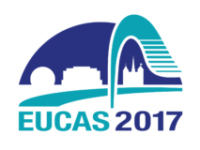Speakers
Description
Abstract
Many power device applications are under development using superconducting materials. Novel designs have been proposed to take advantage of the unique properties of superconducting materials and to achieve higher performance standards compared to conventional power devices. The short course on Superconducting Power Devices will cover Superconducting Fault Current Limiters, Superconducting Transformers, Superconducting Rotating Machinery, Superconducting Cables and Superconducting Magnetic Energy Storage. The course will cover the basics of each application and describe the latest developments and ongoing projects in each application category. The course will also summarize on future directions and research needs for advancing Superconducting Power Devices technology.
Speaker Bio.
Mathias Noe
Mathias Noe has received his M.S. in Power Engineering in 1991 and his Ph.D. in 1998, both from the University of Hanover in Germany. After a Postdoc position at the Ecole Polytechnic Federale de Lausanne in Switzerland, he joined Forschungszentrum Karlsruhe in 1998 and became later group leader for high temperature superconducting power devices at the Institute for Technical Physics. Since 2006 he is director of the Institute for Technical Physics at the Forschungszentrum Karlsruhe and full professor for technical applications of high temperature superconductivity at the faculty of electrical engineering and information technology of the University Karlsruhe. In 2009 Forschungszentrum Karlsruhe and Karlsruhe University merged to the Karlsruhe Institute of Technology (KIT). The Institute for Technical Physics is a national and international centre of competence for applied superconductivity and cryogenics. Prof. Noe is active in the field of new energy technology and applied superconductivity since 1991 and is the author of more than 100 reviewed articles in this field. He is spokesperson of the Helmholtz Program Energy Storage and cross-linked Infrastructure and Coordinator of the EERA Joint Program Energy Storage. In addition, he is member of several boards, panels and committees in his research field among them he served from 2011-2015 as a president of the European Society of Applied Superconductivity.
Mark Ainslie
Mark Ainslie received the B.E. (Electrical & Electronic) & B.A. (Japanese) degree in from the University of Adelaide, Australia, in 2004, the M.Eng. degree from the University of Tokyo, Japan, in 2008, and the Ph.D. degree from the University of Cambridge, UK, in 2012. In 2011, he was awarded the European Society for Applied Superconductivity (ESAS) Young Researcher’s Award in Large Scale Applications for his PhD work on transport AC loss in high-temperature superconducting (HTS) coils. From 2012-2017, he was a Royal Academy of Engineering Research Fellow in the Bulk Superconductivity Group at the University of Cambridge, where he investigated the engineering interactions of conventional, magnetic and superconducting materials for electrical applications. This work focussed on the use of HTS materials in bulk and wire form to increase the electrical and magnetic loadings of an axial gap, trapped flux-type superconducting electric machine. In July 2017, he became an EPSRC Early Career Fellow, also in the Bulk Superconductivity Group, as the principal investigator of a five-year, £1.1 million project investigating the use of bulk HTS materials in portable, high field magnet systems. His research interests cover a broad range of topics in applied superconductivity in electrical engineering, including superconducting electric machine design, bulk superconductor magnetisation, numerical modelling, and interactions between conventional and superconducting materials.
Antonio Morandi
Antonio Morandi holds a PhD in Electrical Engineering. Since 2006 he is with the Department of Electrical, Electronic and Information Engineering where is appointed professor of Elements of Electrical Engineering, Electric Energy Storage and Applied Superconductivity. He is also supervisor of PhD programs on Applied Superconductivity. His research interests are on power applications of High Temperature Superconductors and advanced energy systems. He has coordinated several research projects in this field funded by Public Agencies and by private companies and has contributed to the prototyping of superconducting power apparatus (FCL and SMES) and to the development of modelling and design tools. Antonio Morandi is author of about 50 technical papers published in international journals and conferences. He is inventor of two patents. He is reviewer of research projects in the energy sector for the European Commission, the Italian Ministry of Education, Universities and Research and foreign research institutes. He has given several invited talks at international conferences and research associations and has moderated several technical discussions. He is member of the Italian mirror Committee IEC TC90 – Superconductivity and is member of the International Steering Committee on HTS Modeling. He has been member of program committees in international conferences. He has been the chairman of the 5th International Workshop on Numerical Modelling of High Temperature Superconductors, Bologna-Italy, 2016. Antonio Morandi is member of the ESAS board. He is a senior member of IEEE and serves as technical editor for IEEE Transaction on Applied Superconductivity.




